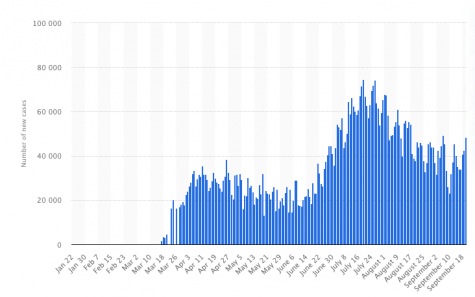United States pulls out of international COVID vaccine effort
October 5, 2020
In an effort co-led by the World Health Organization (WHO), over 170 nations around the globe have begun discussion on a worldwide vaccine distribution effort, known as Covax. The United States of America is not one of those nations.
The main reason for the U.S. refusal to join is the heavy involvement of the WHO. U.S. President Donald Trump has made it very clear that he and the White House do not want to work with the organization, which Trump has panned as being “China-centric.”
“The United States will continue to engage our international partners to ensure we defeat this virus, but we will not be constrained by multilateral organizations influenced by the corrupt World Health Organization and China,” said Judd Deere, a spokesman for the White House.
The main goal of Covax is to help fund the vaccine effort and to enable equal access to a potential vaccine for those affected around the world. There are pieces in place that aim to allow participating nations and their researchers to contribute candidate vaccines to the COVAX facility.
These candidate vaccines could potentially be effective, but require further testing to ensure that they are safe for use. The facility will act as a centralized location for these items to be tested and eventually distributed.
Stefan Löfven, the Prime Minister of Sweden, said, “Equal access to a COVID-19 vaccine is the key to beating the virus and paving the way for recovery from the pandemic.” Sweden is among the countries that have committed to supporting the effort.
The United States initially began as one of the WHO’s founders and largest donors. Trump even praised the WHO and China’s handling of the virus in its early outbreak before swiftly doubling back on those statements weeks later.
“[The WHO] misled the world when the virus was first discovered by Chinese authorities . . . China has full control over the World Health Organization,” Trump said during a speech on May 29. He would go on to describe how the United States had spent significantly more than China on funding for the WHO and why the U.S. did decide to stop supporting the WHO.
By opting out of the organization, the U.S. effectively commits to working independently in search of a cure. While this would enable the nation to potentially have a vaccine before other nations, it also comes with the risk of the other nations successfully finding the vaccine and it not being brought to America.
It is entirely possible for the United States to still join Covax even after their initial refusal. Given the tension between the U.S. and the WHO, this seems unlikely.
The WHO warned against this behavior and acts of “vaccine nationalism.” They have stated that any country keeping treatments for themselves cannot expect to be safe from other countries that do not yet have a vaccine.
“For the world to recover faster, it has to recover together, because it’s a globalized world: the economies are intertwined. Part of the world or a few countries cannot be a safe haven and recover,” WHO chief Tedros Adhanom Ghebreyesus said.
In sheer numbers, the U.S. has been hit the hardest of any country. As of Sept. 9, 2020, there are 6.43 million confirmed cases within the states and nearly 200k deaths. These totals are both the most for any individual country and they make up 23% of all worldwide cases and 21% of all fatalities respectively.
In less than a year, COVID-19 has proven to be far more than just a novel virus from Wuhan, China. It has evolved into a force to be reckoned with and one that has already wreaked immense havoc upon the world at the start of the decade. Even with vaccines being furiously developed, it remains to be seen just how much these doses can help. Just how long it will be until the people of the world can go about their lives without face masks and fear?
What we do know is that the U.S. intends to go about this problem alone, and all Americans are hoping for the best as they look to push toward a safe and prosperous future.

Graph created and maintained by John Elflein.

